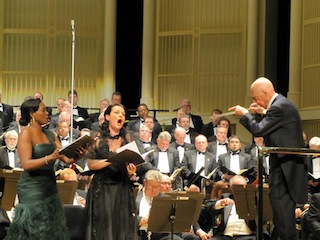
A Verdi Requiem as Fine As One Could Wish
Maestro (“master”) is a word applied to conductors rather
lightly.

One who deserves it fully is Rafael Frühbeck de Burgos, guest conductor with the Cincinnati Symphony Orchestra this weekend at Music Hall.
Frühbeck led the CSO, he May Festival Chorus, directed by Robert Porco, and a quartet of well chosen soloists Friday night (Feb. 28) in a performance of Verdi’s Requiem as fine as one could wish (rivaling any within memory of this reviewer).
Creative director of the CSO from 2011-2013, the Spanish -born maestro – conducting completely from memory -- led with total command and with the kind of sensitivity that causes you not only to grasp the architecture of a work, but to hear details that you have never heard before.
It is no wonder that he was greeted with thunderous applause when he took his solo bow at the conclusion (which he quickly shared with the full ensemble).
Verdi’s Requiem, a religious work penned by an agnostic to honor the memory of a dear friend, is a roller coaster ride of emotions, with everything from abject terror to tenderness. Unlike most Requiems (based on the Roman Catholic Mass for the Dead), it ends with a bit of both, as the chorus calls for eternal rest for the deceased (“may light perpetual shine upon them”) while repeating its cry for mercy on the Day of Judgment. (Hear associate conductor Robert Treviño’s insightful pre-concert lecture at 7 p.m. before tonight’s repeat.)
Greatly enhancing the performance were the soloists, soprano Angel Blue, mezzo-soprano Julia Gertseva, tenor Aquiles Machado and bass Riccardo Zanellato.
The work began with the Chorus' whisper-soft supplications of “Requiem” (“Peace”) over muted strings, setting a deeply reverential tone. Immediately striking as the text moved into the “Kyrie Eleison” (“Lord have mercy on us”) were the unity and transparency of the Chorus, with every word clearly audible.
The “Dies Irae” (“Day of Wrath”), longest portion of the work with nine sub-sections, exploded through the hall, with percussionist Richard Jensen producing shattering reports on the bass drum. Four offstage trumpets (in the forward right and left balconies) took the conflagration to a fever pitch, followed by total silence as bass Zanellato intoned “Mors stupebit” (“Death will be stunned”), followed by warm-toned mezzo Gertseva’s “Liber scriptus” (“The book will be brought forward”). The big, resounding “Rex tremendae” (“King of majesty”) was capped by a touching “Salva me” (“Save me”) by the Chorus and soloists.
Playing by the CSO was outstanding throughout the work, witness principal bassoonist William Winstead’s sinuous solos in “Quid sum miser” (“What shall I say?”) and the cellos’ graceful introduction to the “Offertorio.”
Soprano Blue and Gertseva were a mellifluous duo in the “Recordare” (“Call to mind”). Tenor Machado delivered a soaring “Ingemisco” (“I groan”) and a nuanced “Hostias” (“Sacrifice we offer”) and Zanellato showed himself a true basso cantante in his bronze-edged “Confutatis maledictus” (“When the cursed have been silenced”) The Chorus provided a well of light with their bright, snappy “Sanctus” ("Holy, holy, holy")
Frühbeck brought out the violas during the “Agnus Dei”
("Lamb of God") with Blue and Gertseva for a welcome splash of color,
as he did the violins in the “Sanctus." The audience listened with rapt attention throughout the work, meeting climactic cutoffs with total silence, as if collectively holding their breath.
Gertseva, Machado and Zanellato shone in “Lux aeterna” (“Light perpetual”) before Verdi re-introduced the plaintive shades of “Libera me” (“Rescue me”) to close the Requiem, including a brief return of the “Dies Irae.” This moment was for soprano Blue, whose whispered entreaty was echoed in kind by the Chorus. She made her octave leap on “Requiem” with grace and agility. The Chorus' final, fugal “Libera me” was very dramatic, capped by Blue’s high C before their last soft pronouncements of “Libera me,” which brought the crowd to their feet.
Repeat is 8 p.m. tonight at Music Hall. Tickets begin at $12. Call (513) 381-3300, or order online at www.cincinnsymphony.org.